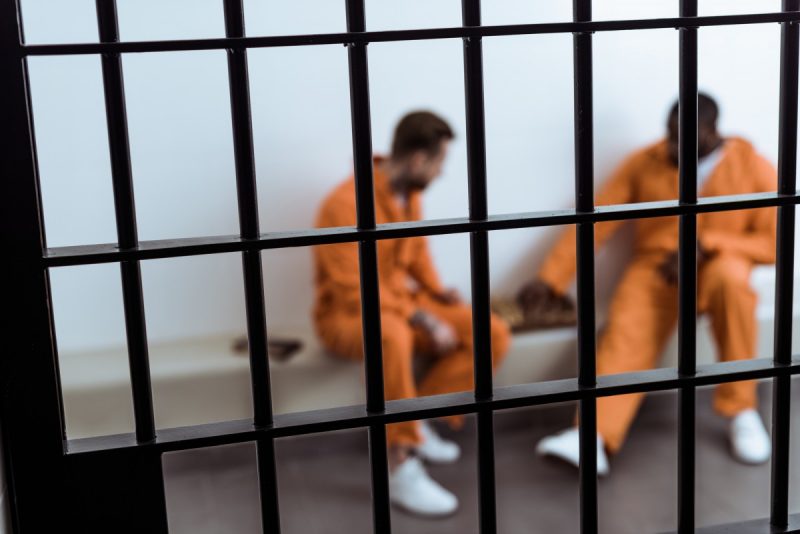There’s a Secondary Stigma Just Knowing Somebody That’s Incarcerated
We’re at the 10th Annual International Prisoners Family Conference and I’m here with Heather Moore. She is working on her thesis and has researched secondary stigma related to prison.
Listen to interview here:
Transcript (edited for readability):
Julia: Heather, it’s just been so nice meeting you and hearing you talk and if you could just tell us a little bit about yourself and whatever you want to share with our listeners.
Heather: I really appreciated being at the conference this year. I think working with people who are incarcerated and then being able to come to a conference where there’s so many like-minded people working toward progress and trying to bring awareness and being the people who are really affected being the ones that are making the change I think is really powerful.
Julia: It really is and most everybody I’ve spoken has agreed that is just such a great atmosphere where there’s no judgment and sharing with people who understand. And how did you get started or involved in in this, this work?
Heather: I’ve been coming to the conference now for the past three and presenting on different topics and area of research and coming to gather more information and meet people who can share more of their stories.
Julia: So, it sounds like you’re a researcher. Do you publish your work anywhere or do you talk anywhere?
Heather: It’s generally for school. I’m working on getting my degree. I’ll be working toward my dissertation. My previous work, my thesis work, was on secondary stigma related to prison.
Julia: And could you tell us a little bit about your research there? What did you find out that might be applicable to our listeners?
Heather: I think it’s probably a lot of what we already know, which is that there is an affiliated stigma. I think that much of it comes from just knowing somebody who might be incarcerated, having a family member or anybody else. But I don’t think that there’s any reason for this secondary stigma. The people who are supporting people in prison didn’t commit the crimes, didn’t make the choices. And to that, I’ll also add that there are so many people in prison for sentences that did not commit crimes. But certainly people who are supporting them are the ones that are exploited, that are taken advantage of and they’re the ones in society receiving that judgment. People in prison, of course, are judged and that’s unfortunate as well. However, they’re removed from some of that judgment just by not being part of society. And so for everybody else that is in society it’s a little bit of an extra burden because not only have they not done whatever that sentence is for, but they’re receiving judgment for it.
Julia: Right. And that that’s what I call the hidden sentence, that those on the outside are actually serving the sentence with their loved one. So the way that people do treat them and judge them does affect them. And that’s why raising awareness is so important so that we can live our lives if we have somebody that is incarcerated or in this prison system. And so how did you get involved in this work?
Heather: This is something I’ve been doing for years through schooling and I think just having different people along the way that I’ve known that have been in prison and understanding how they’re affected and realizing that the person is separate from the sentence. I think it never really made sense to me that good people make bad decisions, but then somehow they become bad people. I’ve never really understood that. So I went into it as far as school and research and tried to find reasons and understand it. And then in doing so, there’s data that backs that up, but somehow we lose the humanity of it.

Heather: I haven’t quite determined what that’ll be. I think it will be the, maybe the experiences of people either in prison or post-release with education. We know significantly, there’s a huge correlation and relevancy with having education and family support with lowering recidivism. But yet we make it really hard for people. A lot of universities still ask about criminal history for people who are applying and that may affect decisions, but even just when people are released, at the top of their list is not get back in college. It’s find a place to live and figure out how to get a job and try to repair their lifestyle.

And I’m not meaning to say that higher education should be part of that list, but if it were an easier hurdle, I think it could really help somebody route themselves to making better decisions and the motivation to complete versus perhaps maybe getting pulled back into bad decisions. And in light of them being released and not having housing options and things, there’s way more important decisions to be made. But I think there’s so much value in education.
Julia: You said that so well. Thank you. And you’re still in school. Are you working on a different thesis now?
Julia: I agree. And when you do pick your topic and you do finish your thesis, it would be awesome to share the information with us so that we could share it with our listeners.
Heather: And I think it’s, what’s interesting about it is, and here at the conference, everybody knows. I’m not telling you or anybody else in conversation anything that is groundbreaking. The trick is trying to get the message out to the people who don’t know or that don’t want to know or that are resistant to listening.
And because of that, it’s hard to listen because then what could we do? There’s so many different opportunities and needs for reform that it’s almost, it’s daunting if you start acknowledging that we have a broken system. My goodness, there’s so many places that needs to be fixed and so it’s a bigger picture than here. But I think at this conference, what’s unique is that there’s power between everybody validating the stories and the experiences and then to move it on, like with the advocacy work that is done into the legislators and to make those stories real. Maybe that’s how we’ll get some traction.
Julia: Right. And we did have some political figures here at the conference and there were things that they did learn and they both said that they did learn a lot. So, having more conversations with our legislators and assembly people so that we can educate them so that they have a better understanding and maybe even have them visit a prison. You just don’t know.
Heather: It’s easy to ignore data. It’s really hard to ignore a person. And I think that’s the, what’s unique about the conference is that though we all know the same information, everybody has a part of it that’s personal and I think that’s what gives it a lot of momentum.
Julia: I agree. Well, thank you so much for your time and let’s stay in touch and whenever you finish your thesis, another year or two maybe?
Heather: Well, probably a couple of years.
Julia: Okay. A couple years.
Heather: Yes, thank you.
Julia: Well we’ll keep everybody posted. Thank you so much.
Read other stories from the 10th annual International Prisoner’s Family Conference:

Globaltel says
The stigma that surrounds a former convict, someone who has paid the debt asked of them by society, follows like a cloud of judgment and negativity wherever they go. That stigma places a barrier to accessing affordable housing, securing a job and moving on with their life once released. This results in high recidivism rates. I often do not bring up my own history of incarceration until I am sure the person I’m conversing with won’t pass judgment based on mistakes of my youth. The fear of rejection is a powerful emotion; most of us want to be accepted. Until we can lose this misconception about a portion of our population, we cannot truly begin to rehabilitate those in need.